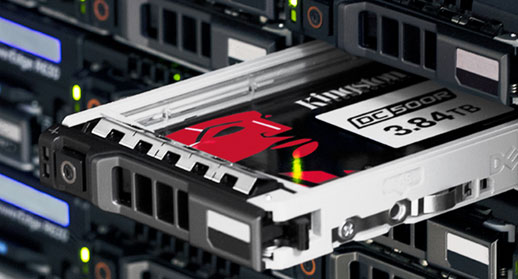Kingston Data Center/Enterprise Solid State Drives
Kingston Technology offers a wide range of data center/enterprise-class solid-state drives (SSDs) recommended for server applications that require I/O consistency, low latency, and higher endurance. Before deciding on an SSD purchase, it is important to understand that not all SSDs are created equal, especially SSDs used in servers. Client SSDs are built for client workloads (e.g. email, web surfing, PowerPoint presentations, gaming, etc.). Data center/enterprise SSDs are built for server workloads (e.g. cloud services, virtualization, high-speed databases, high bandwidth media streaming, SQL server reporting services (SSRS), content delivery networks (CDN), edge computing, SAP BI, ERP, CRM, GL, OLAP, OLTP, ERM and EDW workloads).
In the past, you could give a mainstream client SSD to a data center, and it would be so far superior in performance vs. an conventional hard disk drive (HDD) that with which customers were very happy. Today, especially for data centers, it is becoming mandatory that SSD performance always stays consistent and predictable, and they are testing for this. IT Administrators and Storage Architects are now drawing a line on what is considered “acceptable levels of performance” when making SSD purchasing decisions. This guarantees that they are meeting their SLAs or Service Level Agreements with customers; hence ensuring the customer experience far exceeds expectations.

SSDs designed for server workloads require hardware and firmware features not found on client and consumer SSDs. To start, NAND and controller selection for a data center SSDs are chosen that will provide the best performance and endurance for enterprise workloads. The firmware is then optimized to deliver low latency and consistent IO delivery for high-duty cycle workloads. This performance tuning technique is known as quality of service (QoS), which is how customers can measure enterprise SSD performance to ensure they are selecting a solution that helps to manage and guarantee performance levels to their customers with a high level of confidence.
QoS metrics demonstrate that given a worst-case workload tested over a period of time, an SSD’s latency and IOPS profiles stay within a specified range (typically up to a minimum of 99.9% of the data points over a predetermined period of time), without having unexpected outliers causing a sudden drop in application performance. Storage professionals today require a data center/enterprise SSD to deliver IO consistency and low latency. As part of the product development process, Kingston profiles thousands of data points to achieve a level of QoS that is acceptable for data center applications. Data center customers require a low coefficient of variation in their IO and do not want to see large swings in performance delivery.
Higher endurance ratings tested against data center/enterprise workloads are another important feature to understand. SSD endurance is a key metric in data center SSD design. SSDs have a limited number of program/erase (P/E) cycles over the useful life of the drive. Data center SSDs typically have higher endurance ratings than client SSDs due to the higher P/E cycle flash memory that is utilized. At Kingston, we design a data center/enterprise SSD for a particular endurance range, typically 1 DWPD (drive write per day). This means that a user can write the full capacity of the SSD every day for the warranty period of the drive. It is important to match the right SSD for the intended workload and service life of the server the SSDs will be used in.
Kingston data center SSDs also include hardware power loss protection (PLP) by way of capacitors built into the SSD. Power loss protection is designed to safeguard data in the event of sudden power loss to the server. Lastly, Kingston data center/enterprise SSDs are tested on server platforms and attached to 3rd party and OEM RAID controllers for compatibility. Client SSDs are not tested on server platforms.
Kingston offers five data center/enterprise-class SSD solutions. For SATA solutions, the DC500R is built for read-centric applications, the DC500M is for mixed-use, and the DC450R is for entry-level applications that require lower endurance ratings and do not require costly hardware PLP. For NVMe, Kingston offers the DC1500M for a U.2 PCIe 3.0 NVMe solution and the DC1000B, which is an M.2 2280 PCIe 3.0 NVMe solution typically recommend for server boot applications.
Understanding the key differentiators between client SSDs and data center/enterprise-class SSDs is important for selecting the right product for your design. Use case, product performance, and key features need thorough consideration, and if they align with the customer’s IT requirements. Kingston Technology designs, manufactures, and tests the right SSD to fit your design and budget.
#kingstoniswithyou

Have questions or comments? Continue the conversation on TechForum, DigiKey's online community and technical resource.
Visit TechForum






